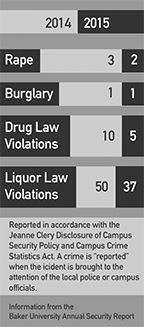Clery numbers released, but administrators question reliability

Image by Sarah Baker.
The annual Clery report, released on Oct. 1, shows that two on-campus rapes were reported in 2015, which was one less than in 2014. Liquor law violations were also down from 50 in 2014 to 37 in 2015.
According to Baker administrators, though, the numbers in the Clery Report can be deceiving and do not always accurately represent the actual incidents of these crimes.
The Clery report is intended to provide consumer protection. It is a federal requirement for U.S. colleges and universities that participate in federal financial aid programs to publish crime statistics.
Title IX Coordinator Cassy Bailey produces an annual security report for every Baker campus. Faculty and staff members help submit these numbers to her, and then she has the final responsibility of verifying and editing them.
“I go through every number and make sure the definition is exact,” Bailey said.
Some of these categories for misconduct include liquor law violations, theft and rape. Bailey and her colleagues also decide how to categorize incidents based on where they occurred, especially making a distinction between on-campus and public property.
“For example, a few years ago we decided to include the fraternities to be considered on campus,” Bailey said. “It all depends on how certain areas in Baldwin are geographically defined.”
However, not all of these numbers represent court cases, or even police involvement. Bailey said a student could be 21 and drinking a beer in the hallway of a residence hall, which is “a violation for us, but according to Clery, it’s not a violation.”
Conversely, if the same situation occurred with a 19-year-old student, that would be counted toward the Clery numbers.
Regardless of how these violations and crimes are reported, Bailey and her colleagues are sure that these numbers do not actually represent every crime or violation that happens on campus.
“It’s confusing,” Bailey said. “You want to do it well and honestly like we have.”
Unfortunately, even if they have reported all the numbers correctly, Bailey doubts the transparency of these numbers.
“The problem is the numbers,” Bailey said. “The numbers are so misleading. Those aren’t the actual number of rapes on a campus.”
The Clery Crime Act has made strides and changed certain criteria in order to include and focus more on gender-based crimes.
The Clery Crime Act now incorporates the Violence Against Women Act (VAWA), which encompasses crimes such as rape, sexual assault and domestic violence.
Even with the additional categories, Bailey is certain that some crimes, especially rape, are under-reported.
“For all of us, these things really matter, and we want them to be transparent,” Bailey said.
Kristin Redding, the campus advocate for the Lawrence Sexual Trauma and Abuse Care Center, said that her job is to help victims figure out their options after they have been assaulted. If a student decides not to report the crime, that is her/his choice.
However, Bailey can’t report what she doesn’t receive. She respects a person’s choice to remain silent or come forward. Nevertheless, she wishes she could change the stigma associated with some of these crimes.
Especially when it comes to sexually based crimes, Bailey fears that students are too afraid to speak out.
“How do we take out the chilling idea of reporting?” Bailey said. “There’s so much victim blaming that happens.”
Redding also agrees that the Clery numbers are extremely low and not an accurate representation of what’s actually happening on campus.
“The long-term goal is for these statistics to be accurate,” Redding said.
Her goal is continue working at the care center to provide students the support and resources that they need so the actual incidents decrease, even if the reported numbers stay the same.
She said that just because the Clery numbers increase doesn’t mean the assault numbers are increasing. More people could just be reporting.
However, the Clery numbers, even if they aren’t totally transparent, are still a necessary measure to create accountability for crimes committed on campus, and hopefully limit those crimes in the future.
“I believe in a system where we let people do as they wish,” Bailey said. “This report is to make those resources accessible so these numbers decrease.”






